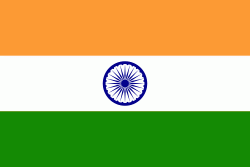Ankola
Ankola is a Town Municipal Council and a taluka in Uttara Kannada district of the Indian state of Karnataka. The name of the place is derived from a forest shrub Ankola grown on the coastal hill side and worshiped by the Halakki Vokkaligas as a totem. The town is around 33 km from Karwar and 86 km from Sirsi.
Ankola is a small town surrounded by temples, schools, paddy fields and mango groves. It is located on the coast of the Arabian sea and has natural beaches. Ankola is known for its native breed of Mango called kari Ishaad as wells as its cashews. Vaidya Late Shivu Bommu Gouda Memorial Hospital is known for the treatment of paralysis.
Ankola is located at 14.66056°N, 74.30472°W. It has an average elevation of 17 m. The Gangavali River (also known as Bedti) is a prominent river that flows near the town. Summer temperatures range between 30 and 35 °C while winter temperatures drop down marginally to between 20 and 33 °C.
Belekeri is a natural port located nearby which is mainly used to ship iron ore to China and Europe.
Ankola is a small town surrounded by temples, schools, paddy fields and mango groves. It is located on the coast of the Arabian sea and has natural beaches. Ankola is known for its native breed of Mango called kari Ishaad as wells as its cashews. Vaidya Late Shivu Bommu Gouda Memorial Hospital is known for the treatment of paralysis.
Ankola is located at 14.66056°N, 74.30472°W. It has an average elevation of 17 m. The Gangavali River (also known as Bedti) is a prominent river that flows near the town. Summer temperatures range between 30 and 35 °C while winter temperatures drop down marginally to between 20 and 33 °C.
Belekeri is a natural port located nearby which is mainly used to ship iron ore to China and Europe.
Map - Ankola
Map
Country - India
 |
 |
| Flag of India | |
Modern humans arrived on the Indian subcontinent from Africa no later than 55,000 years ago. Their long occupation, initially in varying forms of isolation as hunter-gatherers, has made the region highly diverse, second only to Africa in human genetic diversity. Settled life emerged on the subcontinent in the western margins of the Indus river basin 9,000 years ago, evolving gradually into the Indus Valley Civilisation of the third millennium BCE. By, an archaic form of Sanskrit, an Indo-European language, had diffused into India from the northwest. (a) (b) (c), "In Punjab, a dry region with grasslands watered by five rivers (hence ‘panch’ and ‘ab’) draining the western Himalayas, one prehistoric culture left no material remains, but some of its ritual texts were preserved orally over the millennia. The culture is called Aryan, and evidence in its texts indicates that it spread slowly south-east, following the course of the Yamuna and Ganga Rivers. Its elite called itself Arya (pure) and distinguished themselves sharply from others. Aryans led kin groups organized as nomadic horse-herding tribes. Their ritual texts are called Vedas, composed in Sanskrit. Vedic Sanskrit is recorded only in hymns that were part of Vedic rituals to Aryan gods. To be Aryan apparently meant to belong to the elite among pastoral tribes. Texts that record Aryan culture are not precisely datable, but they seem to begin around 1200 BCE with four collections of Vedic hymns (Rg, Sama, Yajur, and Artharva)."
Currency / Language
| ISO | Currency | Symbol | Significant figures |
|---|---|---|---|
| INR | Indian rupee | ₹ | 2 |
| ISO | Language |
|---|---|
| AS | Assamese language |
| BN | Bengali language |
| BH | Bihari languages |
| EN | English language |
| GU | Gujarati language |
| HI | Hindi |
| KN | Kannada language |
| ML | Malayalam language |
| MR | Marathi language |
| OR | Oriya language |
| PA | Panjabi language |
| TA | Tamil language |
| TE | Telugu language |
| UR | Urdu |















